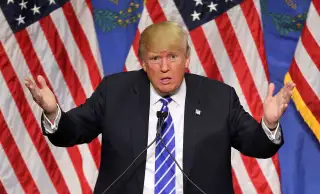Trump's New Auto Policies Could Actually Make Owning a Car More Expensive

President Donald Trump visited Detroit this week to make some announcements that—on the surface at least—will please many car buyers, auto executives, and industry workers alike.
Following through on his promises to cut regulations, Trump ordered the EPA to review the fuel economy standards put in place by President Obama, which called for new cars to get an average of 54.5 miles per gallon by 2025. “The assault on the American auto industry is over,” Trump said, according to the New York Times. “My administration will work tirelessly to eliminate the industry-killing regulations."
The regulations, known as the CAFE program (Corporate Average Fuel Economy), were put in place to address climate change concerns and reduce dependency on foreign oil. But automakers have argued that the standards place an unfair burden on the industry, and, more importantly for consumers, that the rules result in higher-priced vehicles out of line with what car buyers want.
“We are committed to continued gains in fuel efficiency and carbon reduction,” a recent letter sent to Trump by automaker CEOs stated. “At the same time, ignoring consumer preferences and market realities will drive up costs for buyers and threaten future production levels.”
Putting the very serious environmental concerns aside, what are the likely effects of a rollback of fuel economy standards, and of Trump policies in general?
It appears that owning a car will be more expensive over the long haul. Here's why.
Worse Gas Mileage
Even before Trump won the 2016 election, Republican lawmakers were arguing to repeal CAFE standards because they were too expensive, costing $200 billion over 13 years, according to automakers. Besides, the argument went, amid cheap gas prices consumers have mostly seemed uninterested in fuel-efficient models, preferring SUVs and trucks instead.
The rules appear to be steering consumers into paying more for a car feature that's not on the top of their priorities: By 2025, the average price of a new car will cost roughly $3,000 to $4,000 more because of fuel economy and emissions regulations passed under Obama.
It would seem, then, that repealing the rules would save car buyers money, right? Actually, no. While sticker prices for cars would likely decrease or level off if the fuel economy standards disappeared, studies show that the long-term cost of owning a car would increase.
As the annual AAA report shows, the biggest cost of owning a car is fuel, running an average of $1,267.50 during the era of cheap gas in 2016. That's the average, mind you; you'll pay a lot more by driving a gas-guzzler and hitting the road more than the typical owner. The flip side is that drivers can save significant money by owning the kinds of fuel-efficient vehicles being pushed for by the CAFE regulations.
In fact, the Consumers Union has estimated that with the regulations in place, drivers will save $3,200 to $4,800 overall during the course of owning a 2025 model car or truck, respectively. That's a conservative estimate too. The savings could go as high as $5,700 to $8,200 if gas prices rise, and yes, these figures factor in that buyers will be paying more for cars upfront.
Higher Sticker Prices
President Trump has pledged to boost manufacturing employment in the U.S., and has targeted companies like Ford and Toyota for outsourcing jobs to other countries. But there's an obvious reason automakers build vehicles or buy parts outside the U.S.: It's cheaper that way. And as manufacturing costs are lowered, the savings can be passed along to buyers in the form of cheaper car prices.
Correspondingly, if manufacturing costs increase—perhaps by way of more of the work being handled by higher-paid American employees—car prices are bound to rise. Auto analysts have also estimated that the average new car would cost $2,000 to $2,500 more if the Trump-supported import tax goes into effect. Such a border tax is on the table because it would theoretically increase manufacturing and boost the American job market, but the non-profit Center for Automotive Research reported that "at least 31,000 U.S. jobs could be lost" if a hefty new border tax becomes a reality.
Finally, the Consumer Federation of America (CFA) says that weakened fuel-economy rules could hurt American automakers' competitiveness and increase our dependency on foreign oil. "Standards are the only thing keeping us competitive with the high-performing Asian manufacturers," CFA vehicle expert Jack Gillis said recently. "If and when gas prices spike, American automakers will be caught flat-footed as consumers look to foreign brands to save money at the pump."
Rolling back regulations would mean "the only winners will be the foreign oil importers," according to Gillis.